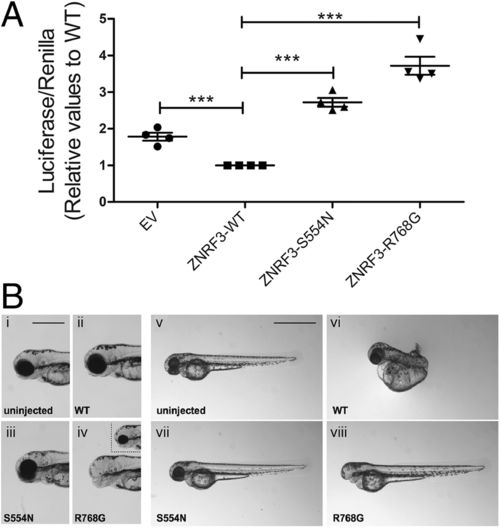Fig. 4
- ID
- ZDB-FIG-180802-1
- Publication
- Harris et al., 2018 - ZNRF3 functions in mammalian sex determination by inhibiting canonical WNT signaling
- Other Figures
- All Figure Page
- Back to All Figure Page
|
Human ZNRF3 variants disrupt ZNRF3 activity. (A) Effects of overexpressing wild-type and variant ZNRF3 on WNT/β-catenin signaling was tested by SuperTOPFlash luciferase reporter assay in KGN (ovarian granulosa cell tumor) cells for 48 h. The reporter constructs were transfected into KGN cells with either the empty vector (EV), wild-type (WT), or variant ZNRF3 expression vectors. The values are expressed relative to ZNRF3-WT. Each data point represents the mean of the value of each experiment ± SEM (n = four independent experiments; each experimental measurement was performed in quadruplicate). Pairwise comparison between the effect of ZNRF3-WT and all of the other conditions was performed using a two-tailed Student t test. ***P ≤ 0.0001. (B) Lateral views of 58-h postfertilization uninjected control (i and v) or injected (12.5 pg, ii–iv; 50 pg, vi–viii) zebrafish embryos. Embryos injected with 12.5 pg of ZNRF3-WT or ZNRF3-S554N show no defects, but ZNRF3-R768G−injected embryos display reduction of the forebrain and either loss (iv) or reduction (Inset in iv) of the eyes. At the 50-pg dose, ZNRF3-WT embryos displayed dorsalization (vi), while ZNRF3-S554N−injected embryos showed no axis patterning defects (vii). At 50 pg, ZNRF3-R768G−injected embryos exhibited posteriorization of anterior structures (viii). |

